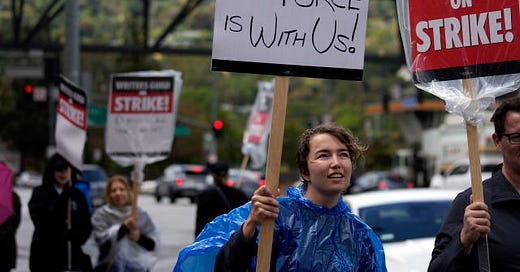Look at Academic Labor to Know Why the WGA Strike Matters
The ongoing writers’ strike has stirred great sympathy, the something rarely seen in the neoliberal onslaught of the last four decades. Students at Boston University taunted David Zaslav with “pay your writers” at their recent graduation, and all kinds of famous actors have joined the picket lines. Unlike too many of my Gen X brethren, younger people who grew up middle class are well aware these days that they are not getting the same sweet deal their parents got. They well understand the empty promises of capitalism.
The fact that so much labor activism and sympathy for the labor movement nowadays comes from knowledge workers is no mistake. For a long time, educated professionals could view themselves as above the fray, comfy in their lifeboats as the immiserated working class drowned all around them in the seas of capitalist exploitation. Lately, however, the waves have been capsizing the lifeboats.1
Strikes happen all the time, and few of them get national attention. When they do, it’s because they speak to something deeper and more monumental than a workplace dispute. The WGA strike is ultimately about whether knowledge workers can maintain their status, power, security, and well-being or if they will be reduced to powerless corporate cogs. If you don’t think that can happen to specialized knowledge workers, talk to an academic.
I left academia twelve years ago, and was glad to do so despite being one of the lucky few with a tenure-track job. After earning my doctorate after seven years of graduate study that required me to write a dissertation based on painstaking archival research in a foreign country and language, I had to take a temporary “visiting professor” gig making very little money at whatever school would have me. While I enjoyed the town I landed in (Grand Rapids, Michigan), my pay was atrociously small and I was not allowed to stay more than three years. When I landed a tenure track job I had to move to rural East Texas and was paid barely more. (As a high school teacher I currently make twice that amount.)
But as I said, I was one of the lucky ones. Others had to “adjunct,” getting paid peanuts on a course by course basis without job security or benefits. It shocked me that universities got the labor of extremely educated and capable people for less than they paid their student work-studies to do menial office labor.
They were able to do it because academics were not organized and completely lacked solidarity. Most tenured and tenure-track profs didn’t even care about the exploitation happening right under their noses. In some cases, when I was a “visitor,” they were openly condescending to me. As long as the tenured folks were safe in their lifeboats, nothing else mattered. They considered themselves a kind of Calvinist elect unconcerned with the fate of the sinners in Hell.
It was all too easy for the university bosses to crush their academic labor force. Their tenure-track faculty were not united across campuses, and many thought of unions as beneath them, something for the grubby blue-collar masses. The adjunct proletariat, with its high rate of turnover and stretched thin teaching on multiple campuses, could not easily organize. The big wig academics at the top of the heap knew that THEIR advisees could still get jobs, so who cares?
Of course, they weren’t safe forever. Colleges and universities across America are gutting humanities departments and telling folks on the tenure track to hit the bricks. The “saved” are drowning now too.
The writers, by contrast, have a union on their side and contracts that protect them no matter which studio they work for. If academics had ever had such a thing, we would not be witnessing the grotesque sight of universities cutting philosophy and languages while building rock climbing walls and state of the art football locker rooms.
***
The masters of capitalism care about one thing and one thing only: maximizing profits and stock prices. They don’t care if you have artistic talent or specialized knowledge; they want to squeeze you until the pips squeak, then throw your drained husk on the trash heap. The thing that can stop them, the only thing, is workers uniting. I am rooting hard for the WGA, and not just because I have family members on the picket lines. This is a strike about something more than residuals; it is about whether knowledge workers can survive. Support the strike, but don’t forget to follow its example.
Now is the time to share one of my favorite lines from the Communist Manifesto. While Marx and Engels were wrong about a lot of things (including the solution to the problems they outlined), they were very right about the nature of capitalism. Ultimately, capitalism aims to turn anyone who doesn’t hold capital, no matter how educated or professional, into a mere wage laborer:
“It has pitilessly torn asunder the motley feudal ties that bound man to his "natural superiors", and has left no other nexus between man and man than naked self-interest, than callous "cash payment". It has drowned out the most heavenly ecstacies of religious fervor, of chivalrous enthusiasm, of philistine sentimentalism, in the icy water of egotistical calculation. It has resolved personal worth into exchange value, and in place of the numberless indefeasible chartered freedoms, has set up that single, unconscionable freedom -- Free Trade. In one word, for exploitation, veiled by religious and political illusions, it has substituted naked, shameless, direct, brutal exploitation.
The bourgeoisie has stripped of its halo every occupation hitherto honored and looked up to with reverent awe. It has converted the physician, the lawyer, the priest, the poet, the man of science, into its paid wage laborers.”



